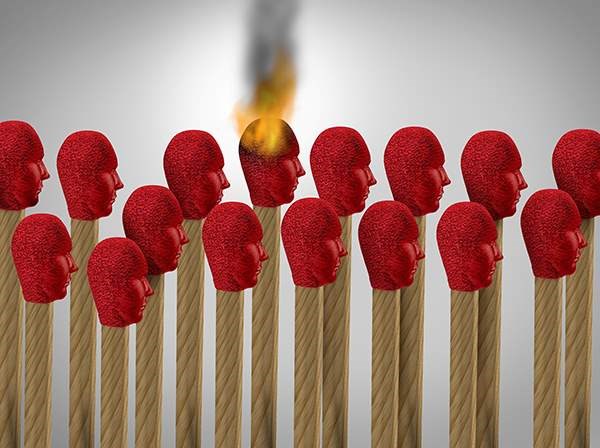Want to get rid of burnout? Routine exercising, eating only lettuce, and removing all stress from your life are the vague pieces of advice you’ll routinely receive on how to avoid burnout in the emergency department.
While this may be helpful, a more genuine and honest perspective is needed - and the June 25th, 2016, episode of EM Clerkship Podcast delivers. We took the opportunity to dive deeper into these issues in a conversation with podcast creator Zachary Olson, MD.
CB + JK: Have you ever personally experienced burnout? What was it like, how did you know you were burnt out?
ZO: Yes, I have definitely experienced burnout during residency… I remember having many sleepless nights, eating lots of Cheetos, drinking too much alcohol, and isolating myself from pretty much everybody who wasn't in my "inner circle." It affected how I interacted with patients. It affected how I interacted with peers. I felt like I couldn't think clearly or creatively.
CB + JK: How did you deal with being burnout and how did you remedy it?
ZO: In my opinion, what always gets missed in our modern discussion on burnout, is that when true burnout hits us hard, all the "self-help" things we learn from lectures or hear on podcasts are rendered useless. Because in retrospect, when I was "burned out" I didn't have the motivation to go to the gym. I had absolutely no desire to hang out socially. I lost interest in hobbies… Quite frankly, it was too late to help myself.
If it wasn't for the kind words of a colleague that year, there is no doubt I would still be messed up. Strangely, he didn't have to say anything insightful or really emotional. He just kept inviting me out to watch sports until I agreed. And then we just... watched sports. After that night was over, I said everything that I needed to say, he listened, I started getting better, and now we're close friends.
CB + JK: What do you think caused it?
ZO: The people around us don't just help us, they are also the primary problem. When I trace my negative experiences back, the vast majority were triggered by something another doctor, or resident, or nurse spoke into my life. I can personally think of 3 examples where those around me triggered some level of burnout within me.
CB + JK: How can the medical community as a whole reduce burnout?
ZO: …[M]y viewpoint on this topic has evolved over the years. I no longer buy into our modern society's self-help, independent culture. I don't believe we can somehow "resolve" burnout on our own by being physically active or socially adept. I believe we are dependent on and directly impact those around us with our actions, with the things we say, and the ways we treat each other.
I cannot emphasize enough how important it is that we treat our colleagues with respect. That we build each other up and don't tear each other down. That we don't gossip about each other. That we hold our tongue when we're in a foul mood. That we cut others slack on their bad days and take the high ground when dealing with all types of health care providers who mistreat others.
Don't get me wrong, I am in no way perfect at this. In fact, for every time an attending or nurse negatively impacted me, I can think of just as many times where I've done even worse to others. But if we truly want to make progress on addressing the issue of burnout, we MUST admit that we are both the problem and the solution. We can't blame the government, the health care system, or our patients. It is our behavior towards our own team that we should be focusing on.
Conclusion
It’s important that we keep the conversation of burnout alive and productive so we can continue to improve on ways to manage it. Dr. Olson brings a unique perspective to the burnout discussion, and as he puts it best, “we get to practice in the best specialty that there is. Hands down. Never forget that!”



